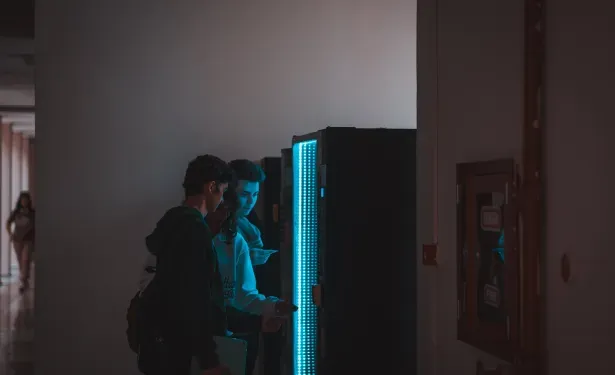In the digital age, vending machines find a new place for themselves.
- Nov. 13, 2023
- FMCG HORECA BUSINESS

The Greek mathematician Hero Alexandria created the first vending machine in history to dispense holy water.
The idea hasn't changed throughout the ages, but technology has, with vending machines of today once again at the vanguard of revolutionising customer choice.
While we typically associate vending machines with providing coffee and snacks, brands are now utilising them for more, and the data they generate has grown to be an important component of the retail environment.Recently, Exeter St Davids train station in the south of England received a book vending machine from Penguin Random House, which brought back the popular device to life in the UK. The action went global, and the publishers received praise for figuring out how to get new readers interested in their works.
After visiting renowned novelist Agatha Christie in St Davids in 1934, Sir Allen Lane struggled to find anything to read on his way and made the decision to create Penguin Books while waiting for a train back to London.He made the decision to place books in commuter book vending machines at stations; the first one, dubbed the Penguin-cubator, was set up in London's Charing Cross in 1937.
The business is currently renewing their use.
"Whiling away your time with a book is one of the great pleasures of train travel and this machine is just what our founder Allen Lane would have wanted to see as he set off on his journey," said Zainab Juma, Penguin's head of brand
"We knew right away that the Penguin Books vending machine was the ideal way to celebrate our roots when Exeter City of Literature approached us about it."
Vending machines are no longer only a convenient method to buy things whenever you want them; thanks to technological advancements, they can now collect data and reflect consumer patterns in real time.
The world of vending has changed over the last ten years, according to David Llewellyn, chief executive of the UK's Vending and Automated Retail Association, who spoke with The National.
"Coffee drives 60 percent of the UK operation, and we have definitely seen a number of changes," he stated.
"People in the UK are accustomed to a variety of coffees; they can now purchase fresh milk, oat milk, and almond milk; the days of freeze-dried coffee are long gone."
"Things are always changing; although in the past you could only get hot beverages from vending machines, now days you can buy whatever you can think of.
"People are living healthier lifestyles and where once sugary drinks were popular we now see people opting for healthier options using the real-time data from the machines."
According to Mr. Llewellyn, technological advancements have revolutionised the sector.
With their circular interiors and glass-fronted screens, they still have a somewhat similar appearance, but the new technology has completely altered the interior. Although it appears to be the same old computer, it is entirely different, the man stated.
Significant changes have occurred as a result of the development of new technologies for stock control.
"You no longer need to waste time driving around to check stock because computers can now determine what stock is needed and where it is needed." It is more effective and affordable.
"We see that 68% of all transactions now take place cashless, which saves money and makes the equipment less susceptible to attack."
Vending machines are making a resurgence not just with books but also with other products that are being used in them for the first time.
The UAE, which unveiled the first gold vending machine in history, is among the nations setting the standard for their creative application.
Additionally, the Aswaaq Al-Mizhar Community Centre in Dubai set up a free bread vending machine during Ramadan last year.
The Mohammed bin Rashid Al Maktoum Global Initiatives programme was developed by Dubai's Roads and Transport Authority with the goal of assisting underprivileged families.
Vending machines, also referred to as silent salesmen, have grown from their modest origins to become a £2.2 billion ($2.75 billion) industry in the UK.
The modern vending machine was first created and patented in Wakefield, West Yorkshire, where it was initially used to sell stamps at train stations.
It quickly evolved and gained widespread recognition as a tool for getting hot beverages.
Eight million cups of coffee and two million glasses of tea are now dispensed daily by the machines.
They are among the six billion products that are dispensed annually.
Gold, bread, and fresh flowers are accessible in vending machines.
A planning permit application was submitted in February to convert two red phone booths that were out of use in London's West End into vending machines.
"The market is still growing," Mr. Llewellyn stated.
"We've noticed a rise in the sales of healthy snack options. The number of drinks that have fewer than five grammes of sugar has increased by 147%.
"People's shifting dietary habits are reflected in the vending machines. We directly witness emerging patterns.
"A few major global players exist, but the majority are small, frequently family-owned businesses that specialise in one or more niche markets. These include traditional coffee, an increasing amount of fresh food, personal protective equipment (PPE) such as masks and sanitizers, ear protection, drill parts, safety boots, and laptop sales.
"A wide variety of products are available these days, including fresh flowers, SIM cards, phone chargers, travel pillows, and book vending machines. There are gold vendors in France and Dubai that sell freshly baked baguettes.
In Japan, customers purchase eggs and bananas with them; in the UK, farms use them to distribute fresh milk; and in Dubai, Cake ATM operates a 24-hour muffin shop at Marsana, which is located in the entertainment and recreation sector of Hudayriyat Island.



